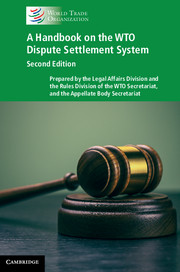The World Trade Organization (WTO) was created in 1995 to provide a forum for the negotiation of agreements to regulate trade, to resolve disputes among members, and to impose sanctions. Its highest authority is the Ministerial Conference, which must meet at least once every two years. The Ministerial Conference can make decisions on any topic that the WTO may address. Below it is the General Council, which “acts on behalf of the Ministerial Conference on all WTO affairs.” It meets as itself, as the Dispute Settlement Body, and as the Trade Policy Review Body “to oversee procedures for settling disputes between members and to analyse members’ trade policies.”
On the WTO's website the Documents Gateway provides access to the official documents of the WTO's councils and committees as well as ttrade statistics, economic research, WTO publications, videos, and more.
Documents Online provides access to the WTO official documentation. The by topic module offers the possibility of browsing by broad subject category. The search module provides searching documents by symbol, country, topic, or full-text search. Guide to Documentation explains how the secretariat organizes its documentation.
The GATT archive on the WTO website was created to provide all official documents issued under the General Agreement on Tariffs and Trade (GATT). This archive is a work in progress. The WTO Gatt Archive gives you the ability to browse the public documents by document symbol, by date, or via a downloadable catalogue that contains document symbols and document titles.
Stanford also has an archive of GATT documents. The GATT Digital Library at Stanford consists of two distinct collections of materials: (1) the digitized version of the GATT Official Documents held on microfiche within the Stanford University Libraries; and (2) a small number of publications series that were not broadly disseminated during the organization's lifespan. The GATT Digital Library at Stanford is searchable and can be limited by date, language, author, genre, collection, and publisher.
The General Council convenes as the Dispute Settlement Body (DSB) to deal with disputes between WTO members. Appeals are handled by the permanent seven-member Appellate Body. The preferred solution is for the countries concerned to discuss their problems and settle the dispute by themselves.
The first stage of dispute settlement consists of consultations between the governments concerned. Members can also ask the WTO director-general to mediate. If consultations fail, the complaining country can ask for a panel to be appointed. Once the panel is appointed, each side in the dispute presents its case in writing to the panel. The panel then holds a hearing. Written rebuttals and oral arguments can be presented at the second meeting. The panel issues drafts of the factual and argument sections of the report to the two parties for comment. After this, an interim report with the facts, arguments, findings, and conclusions is issued and an opportunity for review by the two parties is provided. The panel submits a final report to the two sides that is also circulated to all WTO members. If the panel decides that the disputed trade measure does break a WTO agreement or an obligation, it recommends that the measure be made to conform with WTO rules. The report becomes the DSB’s ruling or recommendation within 60 days unless a consensus rejects it. Both sides can appeal the report.
Appeals can only be based in law and cannot reexamine evidence or new issues. Each appeal is heard by three members of a permanent seven-member Appellate Body. Members of the Appellate Body have four-year terms.
If the country that is the target of the complaint loses, it must state its intention to follow the recommendations of the panel or appeals report at a Dispute Settlement Body meeting. If complying with the recommendation immediately proves impractical, the member will be given a “reasonable period of time” to do so. If it fails to act within a reasonable period of time, it has to enter into negotiations with the complaining country (or countries) in order to determine mutually-acceptable compensation.
 A Handbook on the WTO Dispute Settlement System
A Handbook on the WTO Dispute Settlement System
University of Cincinnati Libraries
PO Box 210033 Cincinnati, Ohio 45221-0033
Phone: 513-556-1424
University of Cincinnati
Alerts | Clery and HEOA Notice | Notice of Non-Discrimination | eAccessibility Concern | Privacy Statement | Copyright Information
© 2025 University of Cincinnati
